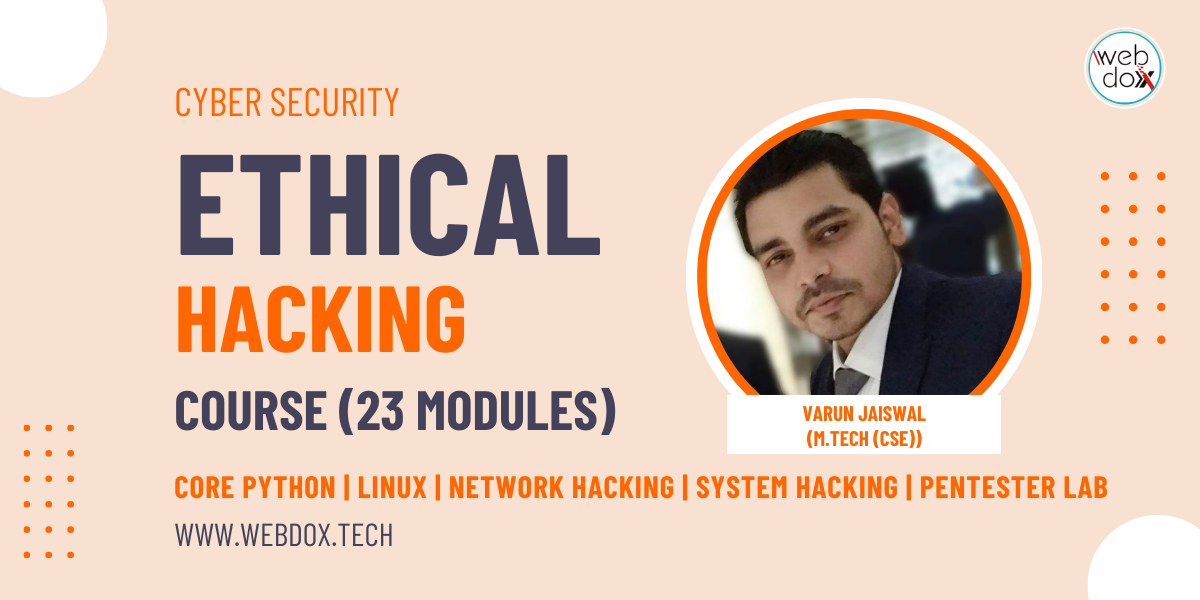Ethical Hacking Course in Jalandhar

Welcome to Webdox Computer Institute's comprehensive Ethical Hacking Course! In today's digitally connected world, cybersecurity has become a critical concern for individuals and organizations alike. This course has been specifically designed to equip students with the knowledge and skills necessary to protect computer systems and networks from potential threats. With hands-on training, practical exercises, and expert guidance, we aim to nurture the next generation of ethical hackers who can contribute to the security of the digital landscape.
Module 1: Introduction to Ethical Hacking
- Understanding the role of ethical hackers
- Legal and ethical considerations
- Differentiating between black hat, white hat, and gray hat hackers
- Introduction to hacking methodologies and tools
Module 2: Footprinting and Reconnaissance
- Passive and active information gathering techniques
- Profiling targets
- Understanding network and host vulnerabilities
- Search engine hacking and footprinting
Module 3: Scanning Networks
- Understanding network architecture
- Port scanning and enumeration
- Vulnerability scanning and assessment
- Network mapping and discovery
Module 4: Enumeration and System Hacking
- Identifying active hosts and open ports
- Service enumeration
- Password cracking techniques
- Privilege escalation
Module 5: Malware Threats and Countermeasures
- Types of malware (viruses, worms, Trojans, ransomware, etc.)
- Malware analysis and detection
- Implementing antivirus and antimalware solutions
- Incident response and recovery
Module 6: Network and Web Application Vulnerabilities
- SQL injection attacks
- Cross-Site Scripting (XSS) vulnerabilities
- Cross-Site Request Forgery (CSRF) attacks
- Security misconfigurations
Module 7: Wireless Network Security
- Types of wireless networks and their vulnerabilities
- Cracking WEP, WPA, and WPA2 encryption
- Rogue access points and network sniffing
- Implementing secure wireless solutions
Module 8: Cryptography and Steganography
- Fundamentals of cryptography
- Encryption algorithms and techniques
- Digital signatures and certificates
- Steganography and hiding information
Module 9: Social Engineering and Physical Security
- Psychological manipulation techniques
- Phishing, pretexting, and baiting
- Dumpster diving and physical intrusion
- Mitigating social engineering attacks
Module 10: Web Application Security and Penetration Testing
- Web application vulnerabilities
- OWASP Top 10
- Exploiting and securing web applications
- Web penetration testing methodologies
Module 11: Mobile and IoT Security
- Mobile security challenges and threats
- Securing mobile devices and applications
- IoT vulnerabilities and countermeasures
- Ethical hacking of mobile and IoT devices
Module 12: Ethical Hacking Tools and Frameworks
- Introduction to popular hacking tools (Metasploit, Nmap, Wireshark, etc.)
- Frameworks for ethical hacking (Kali Linux, Parrot OS, etc.)
- Setting up a virtual lab environment
- Best practices for ethical hacking engagements
Conclusion:
By completing this comprehensive Ethical Hacking Course, you will gain a deep understanding of the techniques, tools, and methodologies employed by ethical hackers. You will be equipped to identify vulnerabilities, assess risks, and implement effective security measures. Webdox Computer Institute is committed to providing you with the knowledge and skills needed to excel in the field of cybersecurity. Join us and embark on an exciting journey to become a proficient ethical hacker!
Webdox is an ISO Certified and MSME Registered Computer Institute which is located in Jalandhar. Webdox is a Trademark Owned by Webdox Infotech (OPC) Pvt. Ltd.
© Webdox.tech. All Rights Reserved. 2024